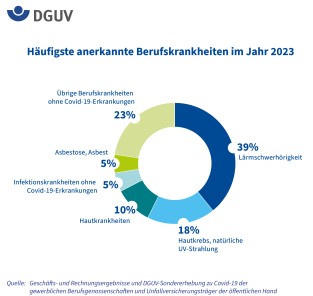A Social Achievement Turns 100
Since 1925, Social Accident Insurance Has Also Covered Occupational Illnesses
09.05.2025
For 100 years, social accident insurance has covered occupational diseases. On 12 May 1925, the first Ordinance on Occupational Diseases was enacted, in part to further strengthen social peace. The initial list of occupational diseases comprised eleven diseases. These included diseases caused by lead, phosphorus and cataracts among glassmakers, reflecting the working world of the time.
Thanks in part to continuous improvements in occupational safety, the diseases listed at that time no longer play a significant role today. Since 1925, more and more diseases have been added to the list of occupational diseases. With the addition of three new diseases in April this year, there are now 85 occupational diseases listed.
The incidence of occupational diseases is dynamic. It reflects changes in the world of work and other developments. A striking example of this is the COVID-19 pandemic. It led to an unprecedented increase in the number of cases: between 2020 and 2023, more than 540,000 suspected cases of occupational diseases related to COVID-19 were reported to social accident insurance institutions. Never before have social insurance institutions received and processed so many notices of suspected cases of occupational disease in such a short period of time.
Individual prevention instead of giving up work
"The Occupational Diseases Act is unique in its form. It protects companies and employees not only against known risks, but also in cases where an exposure at work turns out to be harmful to health only later," says Dr. Edlyn Höller, Deputy Director General of the German Social Accident Insurance (DGUV). "Companies can rest assured that such unrecognized hazards will not suddenly become a liability risk. Employees can rest assured that they will receive help and compensation even decades later, even if their employer no longer exists." In 2023, the social accident insurance institutions spent a total of around 1.85 billion euros on insurance benefits for occupational diseases, including benefits for surviving dependants and medical rehabilitation.
Another milestone was the further development of the Occupational Diseases Act at the turn of the year 2020/2021. The package of measures included a particularly intensive discussion on the removal of the forced obligation to stop working, i.e. the obligation of affected employees to give up the work that caused their illness in order for certain occupational diseases to be recognized. Since then, the German social accident insurance institutions have focused even more strongly on individual prevention: "The measures are aimed at the specific health risks at the workplace," says Höller. "This is a win-win situation for everyone: for those affected, because they can continue to do the work that they enjoy and that secures their livelihood. And for the companies, because the measures are specifically tailored to the operational situation, the person affected and their illness."
Contact
DGUV - Pressestelle
Glinkastraße 40
10117 Berlin
Tel.: +49 30 13001-1414
presse@dguv.de
Stefan Boltz (Pressesprecher)
Elke Biesel (Stv. Pressesprecherin)
